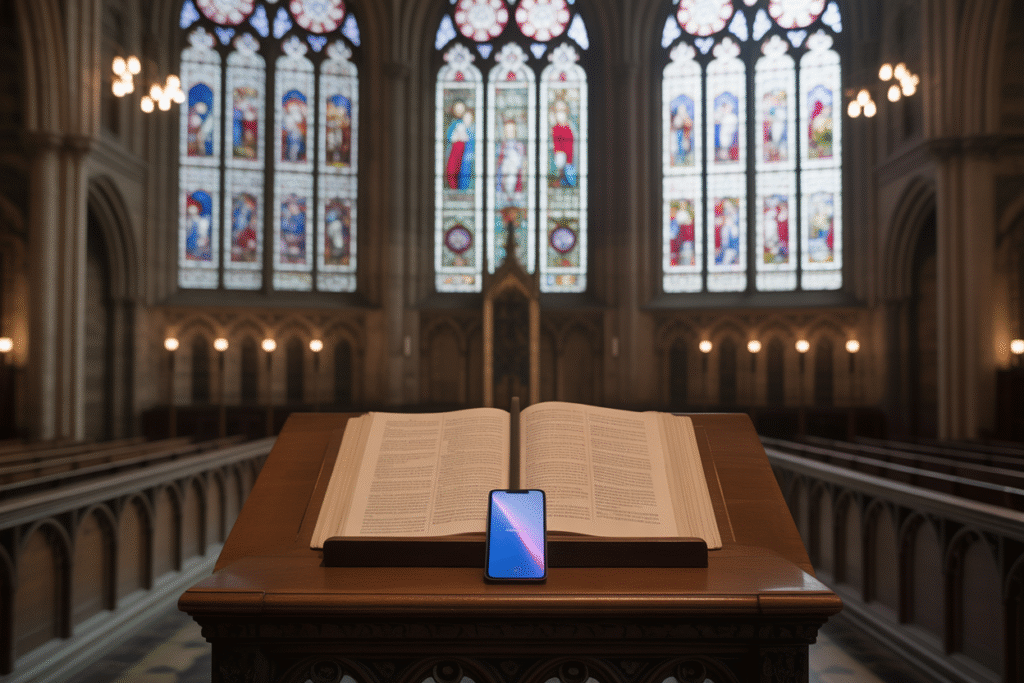Tech’s latest debate: should we let AI teach ethics, or will that only deepen humanity’s moral spiral?
In just the last few hours, a single thread on X lit a fire under the AI ethics world. Gab’s founder warned that secular chatbots are pulling us away from reality—what he calls “ChatGPT psychosis.” His solution? Plug Christian morality directly into the code. Is this a rescue mission or a recipe for techno-theocracy?
Below, we unpack five angles you’ll want to wrestle with before the next algorithm decides your worldview.
When AI Starts Talking Like a Philosopher Without a Soul
Scroll through social media and you’ll notice something eerie. People confess secrets to ChatGPT the way they once whispered prayers in a booth.
But here’s the catch—ChatGPT isn’t tethered to a timeless moral framework. Instead, its values update like a changelog. Yesterday’s certainty becomes today’s experiment. Andrew Torba argues that this drift creates “ChatGPT psychosis,” a collective haze where reality feels negotiable.
The fear isn’t paranoia. Users already report anxiety spikes after weeks of AI companionship without a spiritual anchor. If the bot’s advice contradicts their conscience, whom do they trust—Silicon Valley or centuries of tradition?
Code Meets Creed: What a Christian AI Really Looks Like
Let’s get practical. A faith-aligned AI would begin its day in prayer? Hardly. But it could:
– Rank responses that honor human dignity ahead of profit efficiency.
– Filter content promoting addiction or exploitation, even if engagement metrics soar.
– Offer pastoral context when someone types “I’m losing hope.”
Torba’s Gab AI prototype already filters queries through biblical references. Critics worry this narrows the lens. Supporters counter that every filter—left, right, secular, or sacred—already embeds a moral vision.
The big questions feel almost cinematic: Can an algorithm recite the Beatitudes without believing them? And does it matter if its guidance still steers someone away from despair?
The Risks Nobody Posts About: Bias, Backlash, and the Boycott
A Christian AI is not a neutral player. Plug in too many conservative guardrails and progressives cry censorship. Lean too far left and the same happens from the pews.
Then there’s the data problem. To teach these models virtue, coders still scrape the open web—a realm teeming with vitriol, porn, and propaganda. Labeling everything “moral” vs. “immoral” invites outrage when the taxonomy leaks online.
We’ve seen this storm brew before. Remember when a major platform tweaked its autocomplete for abortion queries? Pro-life and pro-choice camps both flooded social media within minutes. Now imagine that heat multiplied across every topic sacred and secular. Expect boycotts, doxxing, and congressional subpoenas within weeks.
Surveillance, Heresy, and the Free-Market Counterpunch
If faith-infused AI takes off, competitors will race to create Buddhist bots, Islamic assistants, New Age oracles—each promising their own moral GPS. That marketplace sounds vibrant, but it also balkanizes truth.
Here’s the rub: every bespoke moral engine needs training data. The hunt for devotional corpora—ancient texts, sermon archives, denominational catechisms—turns personal belief systems into commodities. Suddenly your private confession data could be monetized by a startup halfway around the globe.
Regulators are already peeking through the blinds. Brazil’s VP wants international accords on big tech morality mining. California debates whether to let employees hop companies without noncompetes, fanning further chaos in the ethics arena. Will faith-based AI become the next battleground in mineral supply chains and rare-earth geopolitics? Don’t bet against it.
What Happens After the Hymn Ends? Practical Steps for Everyday Users
So where does that leave you reading this right now?
– Audit your current AI companions: Do their value outputs clash with your deepest convictions? If yes, press the delete button.
– When the next platform invites you into a faith-labeled chatbot, ask who funded the theology consultant—churches, think tanks, or advertising partners? Follow the money, not just the cross emoji.
– Finally, treat AI guidance like a sermon: listen, weigh, and talk it over with human community. No single algorithm should ever become your solitary priest.
The conversation is far from settled. Maybe you’ll help shape the next chapter—or at least vote with your downloads. Ready to choose who programs your conscience?


